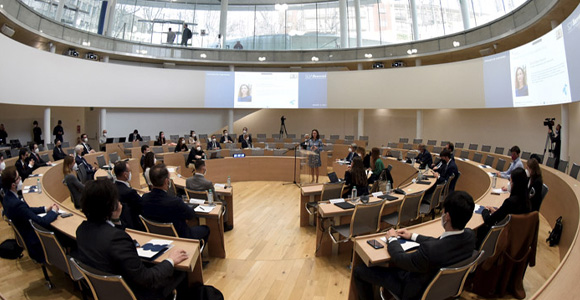Carmelo Cennamo
Research Lab director
Professor MSO of Strategy and Entrepreneurship, Strategy and Innovation department, Copenhagen Business School
Affiliate Professor, SDA Bocconi School of Management
How do Digital Markets work and what should the (right) principles for regulating gatekeepers be? A dedicated research Monitor of DEVO LAB focused on providing factual evidence on how digital markets work, and examining and understanding the new, ex-ante competition regulation’s principles and their implications for the working of the platform economy.
Platform-based marketplaces and ecosystems are new ways to organize economic activity among multiple players within and across several sectors, drive technology evolution, stimulate new product and service innovation and enhance value (co)creation for consumers.
Platform organizing, with their digital marketplaces and ecosystems of service providers, is critically changing the economics of products and entire sectors, providing new ways for companies to generate and deliver value to final customers. However, as these new platform-centric economic structures substitute for the established ones (such as traditional markets and supply chains), there are increasing concerns over the dominant role of platforms acting as market “gatekeepers”. Particularly, under scrutiny is how value is distributed among the different actors, and the extent that platform firms can entrench their position against actual and prospective competitors.
The mounting pressure on policymakers to rein in the increasing power of Big Tech companies has led to a number of legislative initiatives around the world advancing new competition rules. Accordingly, new principles of “fairness” and “contestability” are gaining traction as basis for a new regulatory framework of digital markets, with the EU’s recent Digital Markets Act (or DMA) proposal providing a reference in this area.
Fairness and contestability remain though largely undefined concepts, subject to different interpretations, and which can lead to ambiguity and uncertainty in the application of the new regulatory regime.
Some have advocated for a broad interpretation that, if applied, would de facto liken digital platforms to sort of network utilities – i.e., digital infrastructures that need to guarantee equal access to and use of data and network resources. In this view, restoring fairness through more equitable distribution of value among platform participants would imply a greater standardization of platform services, forcing gatekeepers to “open up” their ecosystems.
This view is largely based on the “allocative efficiency” logic often echoed by analysis in the economics literature. It is though, a constrained view of the platform economy and the management and governance practices implemented by platform firms. One that misses an understanding of the central “orchestration” role of platforms for innovation and value creation . An unbalanced focus on value distribution in the formulation of the fairness and contestability principles might prove an unfortunate approach; it risks fixing an issue by creating a bigger one – breaking the value creation capacity of platform ecosystems.
How do digital markets actually work? What should the right principles for competition rules be then? The answer requires addressing the following questions:
strong access and interoperability rules? What are the risks of such a forced approach for value creation and innovation, and what are the expected benefits in terms of greater competition?
Understanding the different nature of platform-based organizing is paramount for understanding the platform economy and its new logics of innovation, value creation and competition, and the policy implications they have. We need to understand both competition and innovation dynamics in context to design effective policy. Specifically, of relevance are three research domains:
Expected research output: The main output of the research program will be in the form of brief reports as well as more thorough academic research papers on the following topics:
The research lab will conduct research and elaborate on those topics through a two-year research program to enhance our understanding of the platform economy through the use of theoretical as well as applied research. The research program will follow the rigorous process of academic research, yet, starting from research questions that are of pressing significance to companies and policy makers. It will generate research-based output (academic papers as well as practice-oriented reports) to advance proposed solutions informing the general debate and specific initiatives of policymakers. The activities of the research lab will be carried out in collaboration with the Devo Lab of SDA Bocconi, by involving a core, dedicated research group at the Devo Lab, as well as engaging other established scholars of platforms and ecosystems, who will contribute to specific research projects.
Research Lab director
Professor MSO of Strategy and Entrepreneurship, Strategy and Innovation department, Copenhagen Business School
Affiliate Professor, SDA Bocconi School of Management
Associate Professor Of Practice
SDA Bocconi School of Management
Associate Professor Of Practice
SDA Bocconi School of Management
Associate Professor
Bocconi University
Associate Professor Of Practice
SDA Bocconi School of Management
Junior Lecturer
SDA Bocconi School of Management
Junior Fellow
SDA Bocconi School of Management
2023
3 April 2023 - Competition for and with data
2022
21 September - The Platform Economy and Digital Markets: new principles for competition, innovation and regulation
Digital platform marketplaces and ecosystems are new ways to organize economic activity among multiple players, which are critically changing the economics of products and services, and entire sectors. They are a new powerful force driving technology evolution, product and business model innovation, and the creation of new markets, all of which provide new ways for companies to generate and deliver value to final customers. As their centrality in the modern, digitally-enabled economy mounts, the firms controlling these digital platforms are also increasing their economic power and potential to control directly or indirectly the directions of innovation and terms of economic exchanges in digital markets. There are increasing concerns over the dominant role of platforms acting as market “gatekeepers”.
Particularly, under scrutiny is how value is distributed among the different actors, and the extent platform firms can entrench their position against actual and prospective competitors. Accordingly, new principles of “fairness” and “contestability” are gaining traction as a basis for a new regulatory competition framework for digital markets, with the EU’s recent Digital Markets Act (or DMA), which has implications far more reaching than the target BigTech companies, potentially affecting the functioning of current digital markets as well as emerging digital markets in more traditional sectors.
In this event, we will debate some of the more pressing and open issues with academic experts, as well as representatives of the antitrust authorities and BigTech companies. During the event, it will also be presented the focus and research program of newly born SDA Bocconi's research lab on the digital platform economy and regulation.
2022
The Digital Market Act: Regulating market openness or ecosystem functioning?
Discover more
2021
“In medio stat virtus”: Targeted advertising in social media platforms with heterogeneous participants
Discover more


